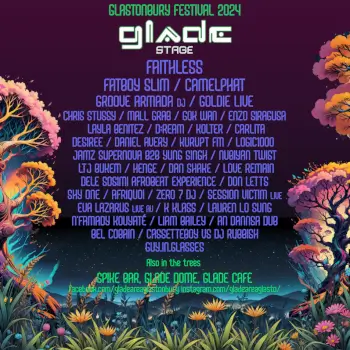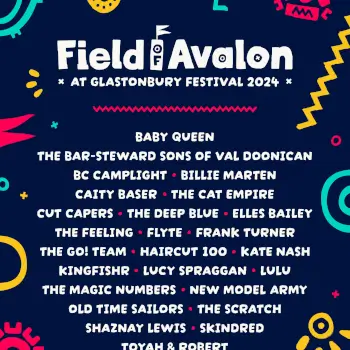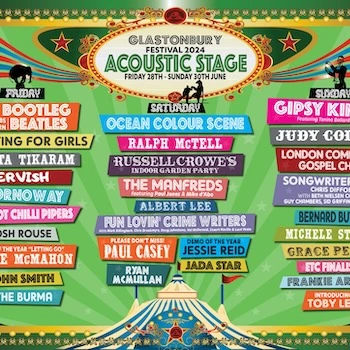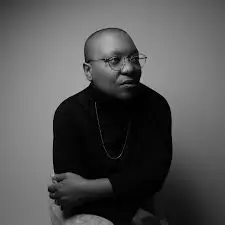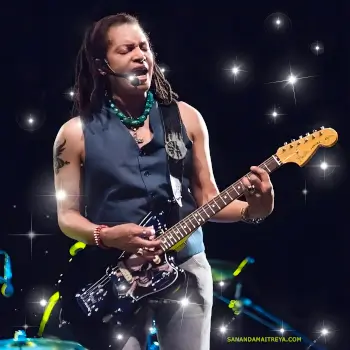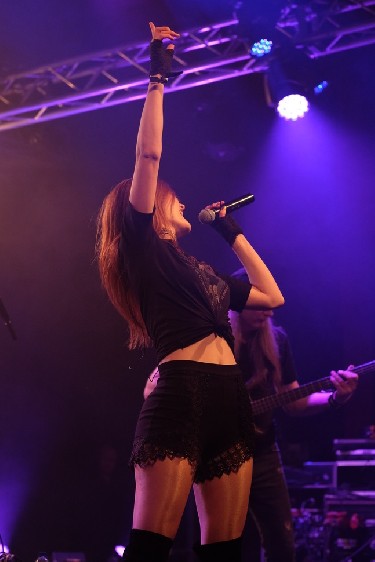
HRH Prog 5 2017
Thursday 16th to Sunday 19th March 2017Camp HRH, Pwllheli, Gwynedd, LL53 6HJ, Wales MAP
from £123.13 (based on 8 people sharing)
HRH is nothing to do with Royalty (although there is a Royalty enclosure, of which more later). It stands for Hard Rock Hell, which is not an entirely enticing prospect as we drive towards north-west Wales, but we like the sound of the Prog part, and the line-up looks really good.
You don’t pay for the approach to the site, but it definitely enhances the experience. Early spring in Snowdonia, new lambs among the sheep on the mountainsides, the first hint of green in the hawthorn hedges, rooks building nests in the trees, and then you descend towards the pretty Welsh seaside towns. It’s a lovely drive.
The festival runs over Thursday, Friday and Saturday, with nothing to do on Sunday except leave. It works. You can have a great time and still have a clear head for work.
On Thursday afternoon arrival time it’s predictably busy, but the staff are numerous, good at their jobs, efficient and smiley. At first the site seems huge, but it’s set out so that it’s further to drive than to walk, so it turns out to be quite manageable. Accommodation is clean and tidy and has everything you need, but it’s designed for a family, so if you’re couples sharing you’ll have to draw straws for who gets the kids’ bedroom.
Problem with the plumbing? Go over to reception to report it, and before you get back the maintenance man’s there with his spanner. Problem solved.
There are two venues, a bit oddly called the Main Arena and Stage Two, but on Thursday only the big stage is open. This is an advantage if you suffer from indecision.
The first band on, at 6.30, are Jump. The singer, the Welshly named John Dexter Jones, confesses he’s from Bangor, in Gwynedd. He claims that’s not why they got the gig, and apologises for his choice of shirt, which is not Prog enough. The sound is good and the band are excellent. This is Folk-Prog. They sing about hanging, witchery, shipwrecks, land-grabs and wars. And he sings like he means it, which is one of the most important things a singer can do. It’s political, and heart-felt; the sound is something like Marillion and something like early Genesis. In the song called The End of Days he sings We have red eyes. No we don’t. It’s not even eight o’clock yet.
There’s not much more politics in the festival, but the notable exception are The Gift, who play Stage Two on Saturday. They’re not Folk-Prog, more like Punk-Prog, but in a good way, thoughtful and considered, and not at all shouty. The songs are very much lyric-driven. There is a song about the UK drifting away from Europe... and from reason. Their magnum opus is an album-length song about the Iraq war, and they sing an excerpt from it. Astonishing. The singer, Mike Morton, is obviously a serious man, but he’s a charmer. He loves being there, and the crowd warm to him. He introduces a song by saying it addresses the question, is the mystery of love greater than the mystery of death; and can he have Prog points for pretentiousness? It’s actually a lovely song about bereavement. The band also get additional points for sudden, over-the-top keyboard effects. Prog points are to become something of a theme of the festival. The band do have a weakness: the guitarist can’t play without his hat on. Morton demonstrates this by snatching it from his head part way through a solo.
Sonja Kristina of Curved Air said she was going to do a political song, and then sang about Marie Antoinette. The piano solo was received in hushed appreciation. They spent so much time doing new stuff they had to squeeze Vivaldi into one minute and 15 seconds, when it deserves at least 15 minutes, and canons. It Happened Today didn’t happen at all, which was disappointing. They have points in the bank for having the drummer with the Proggest name (Florian Pilkington Miksa, if you didn’t know).
The Main Arena and Stage Two are extremely close together. All that’s between them is an outdoor bar, serving rain-lashed smokers. This proximity makes it extremely quick and easy to get from one to the other and maximise the number of bands you can see. If you go to Glastonbury you can lose whole sets walking from one stage to another. There’s no such problem here, and it’s not much more expensive. It’s quite possible to be watching a band at the Main Arena, but nip out to Stage Two to use the toilet there. The Main Arena is much bigger, and it’s here that most of the big names appear. There is a large standing area to the front, and at the back, which is raised up, there are tall stools and tables. Left and right there are separate enclosures with tables and chairs which are labelled as VIP Zones. At the rear left there is something called the Royalty Zone. All these Zones are policed by security to keep the plebs out. They are very friendly and low-key, as are all the security and all the other staff. (If you ever need to know, Search Zone in Welsh is Parth Chwilio.) Separating the punters into first, second and third class in this way doesn’t feel very rock and roll, or very Prog. But it seems that seating is at a premium, and the organisers have made a decision to address the problem, or profit from it, according to your point of view. Like at some other indoor festivals, there are people who queue up for half an hour before the doors open and then rush in and reserve seats for themselves and their army of imaginary friends with coats, bags and jumpers. These are then guarded fiercely until after the last band leaves the stage. There was a little incident with a character who bore some resemblance to Father Jack. “Excuse me, is this seat taken?” “Fuck off!” But he’s an exception. Most people are lovely – friendly, enthusiastic and keen to recommend their favourite bands (and keen to know what you thought of them after their set). And they tidy up after themselves. There are very few tattoos – Prog fans are not fashionistas.
Stage Two is less formally laid out and has standing at the front, high stools and tables at the back, and individual chairs that can be moved around. It’s much more relaxed here. The ceiling is partly glass, which lets in natural light during the daytime slots. There is a theory that’s why there are so few female artists – it’s the glass ceiling.
Also on Thursday, before we were allowed into Stage Two, is The Enid. They are now a trio of young guys. How can this be? Well, they have the blessing of Robert Godfrey, and they’re taking forward his vision. The Enid were a great band. They used to play difficult, slightly overblown music that you could lose yourself in. Well they still are, and they still do. They have a huge sound, with guitar like early Pink Floyd and a full orchestra including brass and woodwind coming out of the keyboard. There is a fine light show behind them. It’s not their own, other bands share the same images, but the robotic animations match their sound brilliantly. They play the song, Who Created Me? from the album Invicta. On the album the song was sung by Joe Payne, who had the voice of an angel. It was quasi-religious. This version, both in the delivery of the vocals and with the light show behind, is robotic. The song has gone from ecclesiastical to android, from Cathedral to Westworld. Brilliant! The new Enid have kept all that was great about the old Enid, and they’ve run with it. This is Prog. You can’t get more Prog than this. And they’re young. And they’re progressing. The future belongs to them!
The Enid were billed to appear twice. On Thursday, the first day; and wrapping things up at the midnight slot on Saturday. The late Saturday set wasn’t the young lads, it was Robert John Godfrey. It was emotional. It was sad.
The band versus brand thing is a bit of a conundrum, it’s like Trigger’s brush. We all know The Fall couldn’t possibly exist without Mark E Smith, but others can undergo a complete change of personnel and still be the same band, like Dr Feelgood, Atomic Rooster, and now The Enid. On the other hand, some bands change so dramatically when a key member leaves or arrives, that they might as well be a different band. Think Fleetwood Mac before and after Peter Green, Genesis before and after Peter Gabriel or Colosseum before and after Chris Farlowe. And then, as you know, you can sometimes get two versions of the same band with different members. Lawyers’ fees, anyone?
Another band carrying on without their main man were Gong, without Daevid Allen, who died a year ago. They came on as a five-piece, with guitars, drums, bass and sax, and started off with two numbers less than two minutes long. However the proper order of things was restored when they played a song they wrote with Daevid called Capital Psychedelic – long, intense, and dreamy. The next song was called Rejoice! I’m Dead. It went on forever. You couldn’t use it for your funeral song, unless you were prepared to pay for overtime at the chapel.
Pendragon were a bit more normal, albeit with Rick Wakeman style keyboards and a drum solo. (Rick Wakeman’s son, Adam, is at the festival, playing keyboards for The Strawbs.) This is the 21st anniversary of Masquerade Overture, “which is an album we did 20 years ago”. They had two female backing singers, who were clearly enjoying themselves. The crowd loved them and they had a nice line in banter.
At the end of the night, if you’re VIP or Royalty, you can go to an after-show party. If you’re not you can go to the bar, or you can go to your caravan to drink the booze you’ve brought with you. There are also options in the morning. You can step out of the site (no gates, no security) and go to the beach. The Wales Coast Path goes right past the site, it’s well-surfaced, easy walking and you can go as far as you like, with rocks and gorse on one side, rocks and sand and sea on the other, and mountains in the distance on both sides. Even if the weather’s not up to much it’ll blow the cobwebs away.
The other option is to stay in bed a bit longer, and just get up in time to see the first band. Red Spektor are a trio of young lads from Stoke, with long hair and neat beards. They have a bluesy, rocky sound, a bit Black Sabbathesque, with wah wah.
Another band on early are Luna Kiss. They are also young lads, a four-piece. It’s not very Prog, but they get the prize for the best banter – it’s almost like a comedy show. Most of their stuff is fairly straightforward blues-rock, well executed. There are slower numbers and they give themselves room to develop their sound. At one point they tell us they’re going to do a cover. “It’s a film score.” “Pretentious?” “Thank you.” Good luck, lads. You deserve to do well.
Pearl Handled Revolver are somewhat closer to middle age, and they haven’t got quite the same way with words. The singer introduces the set by saying, “We’re Pearl Handled Revolver. If you haven’t heard of us before, you will have...later”. He’s not short on confidence, though, gravel-voiced, attacking a tambourine, he’s somewhat reminiscent of Roger Chapman. They start Rocky, but they’re definitely Prog by the time they’ve finished, with incessant keyboard and drums and guitar effects. “Thirteen minutes left. That’s just time for one song.” And it goes down a storm.
You need to eat, and there’s a decent variety of places to choose from. There’s Starbucks, Burger King, fish and chips, Papa John’s, hot dogs. There’s a pub called The Mash Barrel which is slightly away from the venues and pleasant to escape to. They play Hawkwind quietly all the time. Don’t go for the vegetarian noodles, which are over-cooked and soggy; go for the steak, which is cooked right and tasty.
Without doubt, The Pretty Things are the least Prog band at the festival, but that’s not to say they’re no good, they’re very good. They’re proper old blokes. We get two and three minute 1960s R&B songs, acoustic 12 bar blues and talk about Sidcup Art School in 1963. (Wonder how pretty they were back then? They’re not so pretty now.) Towards the end they get a bit freakier, with some guitar that sounds like sitar, and some wah wah. Want to make it Progger? Add some wah wah.
Up against The Pretty Things are Credo. They are a bit on the intense side, with songs about sex, war and starvation, the end of civilization, and watching your children die. Well, we all like a laugh, don’t we? They also have a song called Staring at the Sun. Chance would be a fine thing.
Haze play in the daylight, on Saturday afternoon, and it’s worth missing the football for. They’re not trying to impress anybody, they’re playing because they enjoy it. As a result, everybody enjoys it and everybody’s impressed. It’s not Premier League, but it’s well worth watching, and a lot better than some of the over-paid superstars.
Heights are another young trio. They just do instrumental music, so they get Prog points for that. And they mess around with time signatures. Nice.
Karnataka are named after a state in India. That’s not Prog, really, more Hippy. And they lose lots of Prog points by having a hot young female singer, called Hayley. She wears hot-pants and knee boots and she has the effect of making the photographers in the pit work particularly conscientiously. But she can sing – she gets all the right notes in the right order. The songs go loud, quiet, loud; they’re not far from power ballads, but with guitar and drum solos. The drummer throws his sticks in the air, so he must be good.
There’s a big crowd for The Strawbs. They don’t sing Part of the Union, which is a blessing. This is a bit like West Coast Prog, which obviously isn’t a thing, because Prog can’t be American. But there’s harmony and acoustic guitar. It’s not folky, although Dave Cousins’ very good voice has that nasal folkiness about it. Some of the keyboard goes beyond churchy and into Hammer Horror.
Worst-dressed Awards go to Atomic Rooster’s Pete French, for his leather trousers, and Peter Nicholls of IQ for his charcoal-grey suit with matching shirt and tie. There was no tie-dye, on stage at any rate, so there is no Best-dressed Award, but an honourable mention goes to all members of Gandalf’s Fist for their pirate hats.
The crowd love Hawkwind. The place is packed and they’re on top of their game. It’s like it’s their festival. The band have some problems with their monitors, but there are no sound problems for the fans. There are space noises, lots of space noises, like you used to get in films and on the telly in the 60s and 70s. How did we know that’s what space sounded like? No dancers today. Long numbers that build up and crash, they hit you simultaneously in the head, chest and stomach. This is like dance – intense and repetitive, this is like Suede, this is like Sufi.
The turnaround time between bands on both stages is at shortest ten minutes and at longest 20 minutes. It’s very well organised, and all bands are strictly on time. The set times for each band are much longer than your average festival – minimum one hour, maximum almost two hours. This allows time to develop a set, rather than just throwing together a few favourites. It suits the Prog. Good organisation. It must also be emphasised that the quality of the sound at both venues is excellent.
Now, the highlight of the weekend. Indubitably. The David Cross Band. David Cross plays electric violin, he used to be in King Crimson. He’s very excited, and the musicians he’s got around him are phenomenal. Screaming sax, pounding drums, heavy guitar and bass, and blazing fiddle. Energy, anarchy and loudness; but then there’s a quiet number, they can do sensitive, too. Sax turns to flute and then to penny whistle, it sounds like an Irish air. The sax player, who plays keyboards as well as the other wind instruments, is none other than David Jackson of the legendary Van der Graaf Generator, and he’s having a great time, too. He’s wearing his trademark leather cap and he’s waving his arms around, conducting an imaginary backing orchestra. This is Stage Two, so the audience is relatively small, but they love them and more people arrive through the set. The band start a song called Rain Rain, but they have to stop. Cross explains that he was concentrating so hard on the difficult tempo that he was playing in the wrong key. They start again. Now we know it’s in B minor, but who knows how many beats to the bar? They play the King Crimson song, Exiles, as a tribute to John Whetton, who died recently. These are brilliant musicians, giving us a brilliant time. By way of branding, given the personnel of the band, they could call themselves King Generator, or Van der Crimson. But then in the second case there may be some confusion with Vanda Crimson the porn star, who must exist.
This festival has been a joy. We loved HRH Prog V, and we can’t wait for HRH Prog VI. We’d better start saving up now.
Hard Rock Hell? Prog Rock Heaven, more like.
Paul Champion
March 2017
Latest Updates
 HRH Metal 4 2020
HRH Metal 4 2020festival details
 HRH Metal 4 2020
HRH Metal 4 2020line-ups & rumours
 Hard Rock Hell
Hard Rock Hellfestival home page
 HRH Vikings 2019
HRH Vikings 2019festival details
 HRH Vikings 2019
HRH Vikings 2019line-ups & rumours

